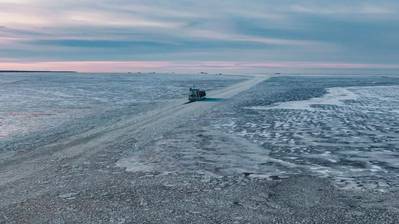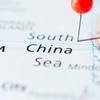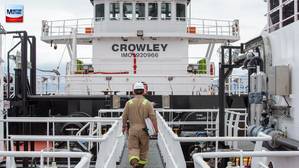Rosatom Inks Deal with Chinese Shipping Company on Arctic Route
Russia's state nuclear agency Rosatom has signed a memorandum of understanding with a Chinese shipping company to establish a year-round container line between the two countries via the Arctic's Northern Sea Route (NSR), it said on Thursday.
Russian President Vladimir Putin has talked up prospects for the Arctic corridor as Russia shifts its trade eastwards in response to Western sanctions over the conflict in Ukraine.
Rosatom said the agreement with China's Hainan Yangpu NewNew Shipping Co. Ltd would establish a joint venture for the design and construction of container ships and the shared operation of the shipping line.
The agreement was signed on Thursday at Russia's annual economic forum in St Petersburg - an event that once drew top Western banks and company executives but whose foreign participants now largely hail from countries still friendly with Russia, including China.
Vladimir Panov, Rosatom's special representative for Arctic development, said 12 voyages were planned for 2024 and the companies hope to ultimately ship up to 50 million tonnes of cargo each year.
"Our main task is to build up to five Arctic-class vessels, which will allow the company to operate on the Northern Sea Route year-round," Panov said.
Rosatom launched a joint venture last year with Dubai's DP World to develop container shipping through the Arctic, a route made viable by the melting of Arctic sea ice due to climate change.
Panov said Rosatom had transported over 2 million tonnes of transit cargoes in 2023, a "record" amount.
"This year, we are now working with shippers, we can talk about a new record - we plan to transport up 3 million tonnes," Panov said.
Chief executive and chairman of DP World Sultan Ahmed bin Sulayem said the NSR has proved to be a "game-changer" for shipping, with supply chain issues and geopolitical instability showing that alternatives to traditional shipping routes were needed.
"But you cannot sell something you don't have," bin Sulayem said. "The important thing is that this has to start."
(Reuters - Reporting by Gleb Stolyarov; Writing by Lucy Papachristou; Editing by Alexander Marrow and David Evans)















